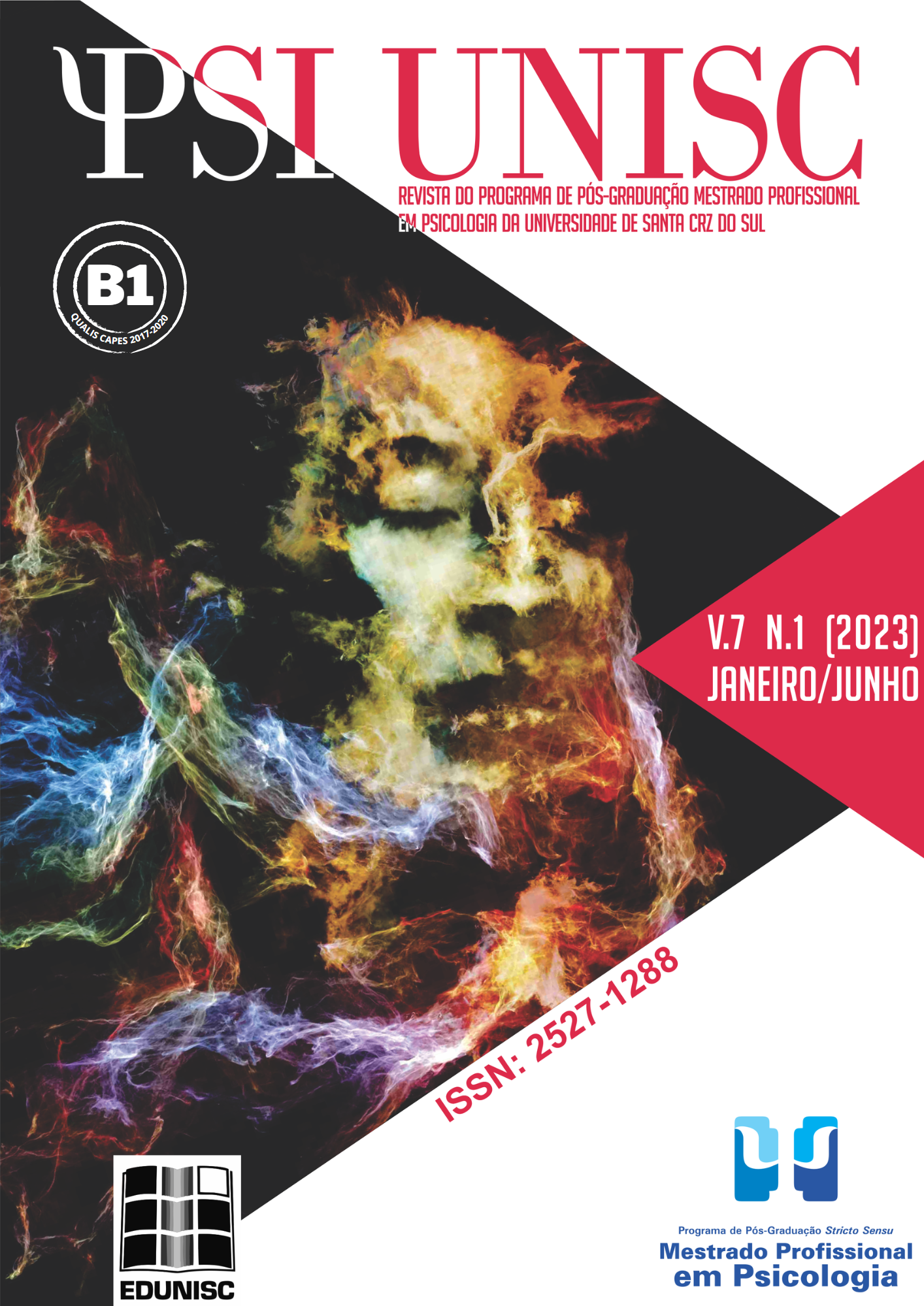Body image and quality of life after bariatric surgery: a longitudinal study
DOI:
https://doi.org/10.17058/psiunisc.v7i1.17754Keywords:
Bariatric surgery, Body image, Quality of lifeAbstract
Bariatric surgery is indicated for people with morbid obesity that have not been successful with clinical treatment, especially those with associated co morbidities. It is well known that the assessment of psychological aspects is important during all stages of the surgical treatment. The aim of this study is to evaluate quality of life and body image dimensions before and after bariatric surgery, identifying possible changes in these dimensions after the procedure. A longitudinal study was performed with assessments on the pre-operatory period and on 1o, 6 o, 12 o e 18 o months after the procedure. The instruments used were: a sociodemographic questionnaire, Beck Depression Inventory (BDI), Beck Anxiety Inventory (BAI), WHOQOL-brief, a Brazilian Silhouette Scale for Adults and the Multidimensional Body-Self Relations Questionnaire (MBSRQ-AS). 109 individuals took part in this study during pre-surgical moment, and 84% of them were female. There was significant increase in the percentage of weight loss (PWL) in all periods of evaluation (p < 0.001). Results of BAI and BDI scales showed symptoms of minimum intensity. In relation to quality of life it was found significant improvement on physical, psychological and environmental dimensions, and the evaluation of boy image showed that after surgery the changes were positive, especially related to body satisfaction and appearance evaluation. In future studies it is recommended to investigate if aspects such as overweight preoccupation and a high investment on appearance would relate to the emergence of eating disorders after 24 months of surgery.
Downloads
References
Cash, TF. (2004). Body image: past, present, and future. Body Image,1(1), 1-5. doi: 10.1016/S1740-1445(03)00011-1
Cash, T. F. (2000). The multidimensional body-self relations questionnaire. doi: 10.1001/jama.2013.280928
Colles, S.L., Dixon, J. B. & O´Brien, P. E. (2008). Grazing and loss of control related to eating: two high-risk factors following bariatric surgery. Obesity, 16(3) 615-622. doi: 10.1038/oby.2007.101
Corcoulas, A. P., Christian, N. J., Belle, S. H., Berk, P. D., Flum, D. R., Garcia, L., … Wolfe, B. M. (2013). Weight change and health outcomes at 3 years after bariatric surgery among individuals with severe obesity. JAMA, 310 (22), 2416-25. doi: 10.1001/jama.2013.280928
Coulman, K. D., & Blazeby, J. M. (2020). Health-Related Quality of Life in Bariatric and Metabolic Surgery. Current obesity reports, 9(3), 307-314. doi: 10.1007/s13679-020-00392-z
Cunha, J. A. (2001). Manual da versão em português das escalas Beck. São Paulo: Casa do Psicólogo.
deMeireles, A. J., Carlin, A. M., Bonham, A. J., Cassidy, R., Ross, R., Stricklen, …Ghaferi, A. A. (2019). A Longitudinal Analysis of Variation in Psychological Well-being and Body Image in Patients Before and After Bariatric Surgery. Annals of surgery, 271(5), 885-890. doi: 10.1097/SLA.0000000000003146
De Panfilis, C., Cero, S., Torre, M., Salvatore, P., Dall’Aglio, E., Adorni, A., & Maggini, C. (2007). Changes in body image disturbance in morbidly obese patients 1 year after laparoscopic adjustable gastric banding. Obesity Surgery, 17(6), 792-799. doi: 10.1001/jama.2013.280928
Fleck, M. P. D. A. (2000). O instrumento de avaliação de qualidade de vida da Organização Mundial da Saúde (WHOQOL-100): características e perspectivas. Ciência & Saúde Coletiva, 5(1), 33-38. doi: 10.1590/S1413-81232000000100004
Geller, S., Levy, S., Goldzweig, G., Hamdan, S., Manor, A., Dahan, S., ... Abu-Abeid, S. (2019). Psychological distress among bariatric surgery candidates: The roles of body image and emotional eating. Clinical Obesity. e12298. doi: 10.1111/cob.12298
Gorenstein, C., Pang, W. Y., Argimon, I. I. L., & Werlang, B. S. G. (2011). Manual do Inventário de Depressão de Beck – BDI-II. São Paulo: Casa do Psicólogo.
Hayden, M. J., Murphy, K. D., Brown, W. A. & O´Brien, P. E. (2014). Axis I Disorders in Adjustable Gastric Band Patients: The Relationship Between Psychopathology and Weight Loss. Obesity Surgery, 24, 1469-1475. doi: 10.1007/s11695-014-1207-0
Helmiö, M., Salminen, P., Sintonen, H., Ovaska, J., & Victorzon, M. (2011). A 5-year prospective quality of life analysis following laparoscopic adjustable gastric banding for morbid obesity. Obesity Surgery, 21(10), 1585-91. doi: 10.1007/s11695-011-0425-y
Hrabosky, J. I., Masheb, R. M., White, M., Rothschild, B. S., Burke-Martindale, C. H., & Grilo, C. M. (2006). A prospective study of body dissatisfaction and concerns in extremely obese gastric bypass patients: 6- and 12-month postoperative outcomes. Obesity Surgery, 16(12), 1615-1621. doi: 10.1381/096089206779319527
Ivezaj, V., & Grilo, C. M. (2018). The complexity of body image following bariatric surgery: a systematic review of the literature. Obesity reviews: an official journal of the International Association for the Study of Obesity, 19(8), 1116-1140. doi: 10.1111/obr.12685
Kakeshita, I. S., Silva, A. I. P., Zanatta, D. P., & Almeida, S. S. (2009). Construção e fidedignidade teste-reteste de escalas de silhuetas brasileiras para adultos e crianças. Psicologia: Teoria e Pesquisa, 25(2), 263-270. doi: 10.1590/S0102-37722009000200015
Lacerda, R. M. R., Castanha, C. R., Castanha, A. R., Campos, J. M., Ferraz, A. A. & Vilar, L. (2018). Perception of body image by patients undergoing bariatric surgery. Rev Col Bras Cir., 45(2), e1793. doi: 10.1590/0100-6991e-20181793
Laus, M. F. (2017). Investimento psicológico disfuncional na aparência: seriam os relacionamentos amorosos fatores de proteção? (Relatório Científico). Faculdade de Filosofia, Ciências e Letras de Ribeirão Preto, Departamento de Psicologia, Universidade de São Paulo, SP, Brasil.
Lindekilde, N., Gladstone, B. P., Lübeck, M., Nielsen, J., Clausen, L., Vach, W., & Jones, A. (2015). The impact of bariatric surgery on quality of life: a systematic review and metaanalysis. Obesity Reviews, 16(8), 639-651. doi: 10.1111/obr.12294
Major, P., Stefura, T., Dziurowicz, B., Radwan, J., Wysocki, M., Małczak, P., & Pędziwiatr, M. (2020). Quality of Life 10 Years After Bariatric Surgery. Obesity surgery, 30(10), 3675-3684. doi: 10.1007/s11695-020-04726-7
Masheb, R. M., Grilo, C. M., Burke-Martindale, C. H., & Rothschild, B. S. (2006). Evaluating oneself by shape and weight is not the same as being dissatisfied about shape and weight: A longitudinal examination in severely obese gastric bypass patients. The International Journal of Eating Disorders, 39(8), 716-20. doi: 10.1002/eat.20311
Mazer, L. M., Azagury, D. E. & Morton, J. M. (2017). Quality of Life After Bariatric Surgery. Curr Obes Rep, 6(1), 204-210. doi: 10.1007/s13679-017-0266-7
Mitchell, J. E., Selzer, F., Kalarchian, M. A., Devlin, M. J., Strain, G.W., Elder, K.A., …Yanovski, S.Z. (2012). Psychopathology before surgery in the longitudinal assessment of bariatric surgery-3 (LABS3) psychosocial study. Surg Obes Relat Dis, 8(5), 533-41. doi: 10.1016/j.soard.2012.07.001
Mühlhans, B., Horbach, T., de Zwaan, M. (2009). Psychiatric disorders in bariatric surgery candidates: a review of the literature and results of a German prebariatric surgery sample. Gen Hosp Psychiatry, 31(5), 414-21. doi: 10.1016/j.genhosppsych.2009.05.004
Munoz, D., Chen, E. Y., Fischer, S., Sanchez-Johnsen, L., Roherig, M., Dymek-Valentine, M., … Le Grange, D. (2010). Changes in desired body shape after bariatric surgery. Eating Disorders, 18(4),347-354. doi: 10.1080/10640266.2010.490126
Munoz, D. J., Lal, M., Chen, E. Y., Mansour, M., Fischer, S., Roehrig, M., … le Grange, D. (2007). Why patients seek bariatric surgery: a qualitative and quantitative analysis of patient motivation. Obesity Surgery, 17(11): 1487-91. doi: 10.1007/s11695-008-9427-9
Olbrich, M. E., Bean, M. K. & Stewart, K. E. (2014). Bariatric Surgery. In Andrasik, F., Goodie, J. L. & Peterson, A. L. (eds.), Biopsychosocial Assessment in Clinical Health Psychology (pp. 405-426). Guilford Publications.
Resolução CFM Nº 2.131/2015. Conselho Federal de Medicina. Altera o anexo da Resolução CFM nº 1.942/10. Publicada no D.O.U. de 12 de fevereiro de 2010, Seção I, p. 72. Recuperado de http://www.portalmedico.org.br/resolucoes/CFM/2015/2131_2015.pdf
Ribeiro, G. A. N., Giampietro, H. B., Barbieri, L. B., Pacheco, R. G., Queiroz, R., Ceneviva, R. (2013). Percepção corporal e cirurgia bariátrica: o ideal e o possível. Arq Bras Cir Dig, 26(2),124-128. doi: 10.1590/S0102-67202013000200011
Robert, M., Denis, A., Badol-Van Straaten, P., Jaisson-Hot, I., & Gouillat, C. (2013). Prospective longitudinal assessment of change in health-related quality of life after adjustable gastric banding. Obesity Surgery, 23, 1564-1570. doi: 10.1007/s11695-013-0914-2
Sarwer, D. B., Lavery, M., & Spitzer, J. C. (2012). A review of the relationships between extreme obesity, quality of life, and sexual function. Obesity Surgery, 22(4), 668-676. doi: 10.1007/s11695-012-0588-1
Sarwer, D. B., Thompson, J. K., & Cash, T. F. (2005). Body Image and Obesity in Adulthood. Psychiatric Clinics of North America, 28(1), 69-87. doi: 10.1016/j.psc.2004.09.002
Sarwer, D. B., Wadden, T. A., Moore, R. H., Eisenberg, M. H., Raper, S. E., & Williams, N. N. (2010). Changes in quality of life and body image after gastric bypass surgery. Surgery for Obesity and Related Diseases, 6(6), 608-614. doi: 10.1016/j.soard.2010.07.015
Song, A. Y., Rubin, J. P., Thomas, V., Dudas, J. R., Marra, K. G. & Fernstrom, M. H. (2006). Body image and quality of life in post massive weight loss body contouring patients. Obesity, 14, 1626-36. doi: 10.1038/oby.2006.187
Tae, B., Pelaggi, E. R., Moreira, J. G., Waisberg, J., Matos, L. L. De, & D’Elia, G. (2014). Impact of bariatric surgery on depression and anxiety symptons, bulimic behaviors and quality of life. Revista do Colégio Brasileiro de Cirurgiões, 41(3), 155-160. doi: 10.1590/S0100-69912014000300004
Teufel, M., Rieber, N., Meile, T., Giel, K. E., Sauer, H., Hünnemeyer, K., … Zipfel, S. (2012). Body image after sleeve gastrectomy: Reduced dissatisfaction and increased dynamics. Obesity Surgery, 22(8), 1232-1237. doi: 10.1007/s11695-012-0690-4
Downloads
Published
How to Cite
Issue
Section
License
The submission of originals to this journal implies the transfer, by the authors, of the printed and digital publication rights. The copyrights for the published articles are those of the author, with periodical rights on the first publication. Authors may only use the same results in other publications clearly indicating this journal as the medium of the original publication. Because we are an open access journal, we allow free use of articles in educational and scientific applications provided the source is cited under the Creative Commons CC-BY license.




